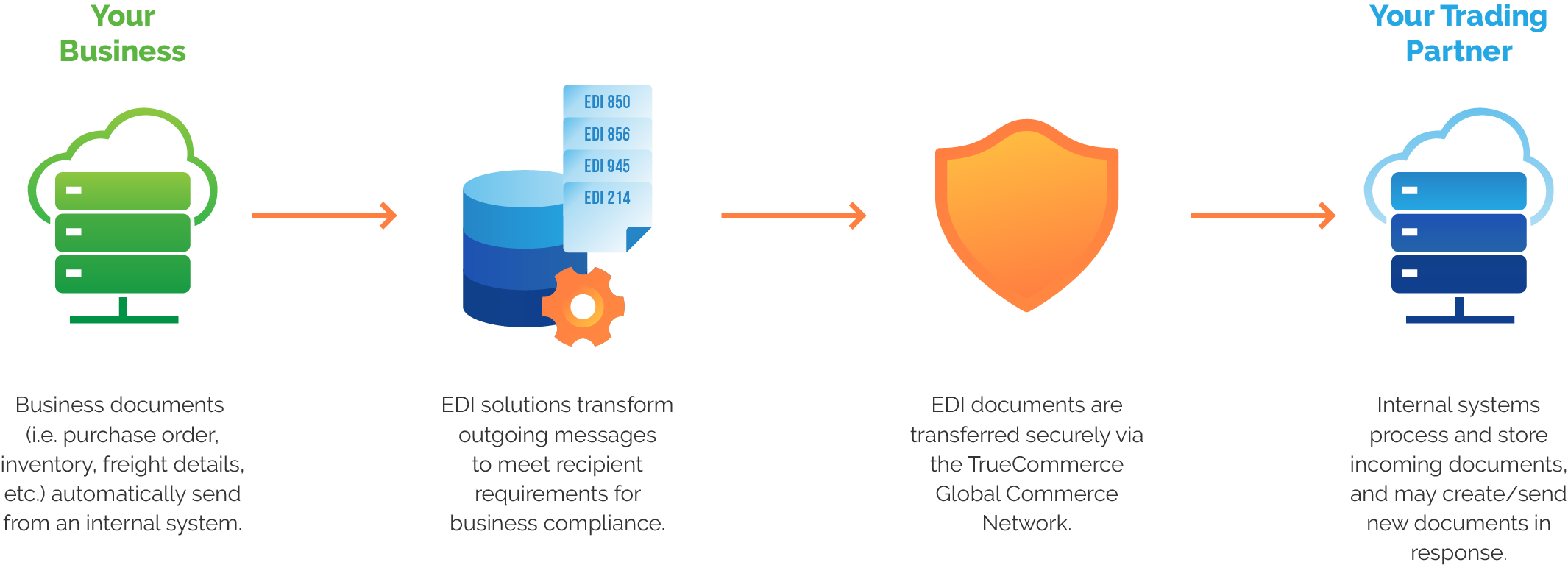The Role of EDI in Logistics

December 7, 2022
The recent explosion of digital commerce — including drop shipping, B2B eCommerce, and B2C online shopping — dramatically altered the logistics landscape for thousands of businesses, especially when it came to shipping and fulfillment. Total online sales in 2021 equaled $870 billion in the U.S., marking a 14.2% increase since 2020 and a 50.5% increase since 2019.
Although many companies are still finding their bearings for shipping direct-to-customer, customers still expect fast, inexpensive shipping.
Electronic data interchange (EDI) software can revolutionize a business’s logistics processes by automating key aspects of data exchange between parties, enhancing shipment accuracy, and much more. This post will explain how EDI supports logistics management for businesses of all sizes.
How EDI Works in Logistics
Implementing an EDI system allows you to automate slow manual processes, such as human data entry, paper purchase orders, and traditional communication methods like PDFs and Faxes. As a result, your business gains the speed you need to keep up with ever-increasing online purchasing.
The process begins when a manufacturer, supplier, or vendor needs to communicate with their logistics team or a third-party logistics provider (3PL). After a buyer places an order, the business can use that order data within the EDI system to create an EDI 940, or Warehouse Shipping order. This goes out to a warehouse, letting them know it’s time to pick, pack, and deliver the products to fulfil the order.
In response to this incoming document, the logistics provider’s EDI system would jumpstart the fulfillment process. The system would then use the existing purchase order and EDI 940 Data, plus data from the logistics provider’s ERP system, to generate an EDI 945, confirming the shipment of the order. That document, in turn, is ingested by the supplier or retailer’s EDI solution and sent to its ERP system. From there, shipment data like tracking numbers can even be sent to the customer, so they know when to expect delivery.
Throughout the order fulfillment process, businesses continuously exchange EDI transaction sets with buyers, suppliers and other trading partners to request and provide information as products move through the supply chain. Integrating sales channels and supply chain partners through logistics EDI optimizes your data transfer processes by replacing manual business practices like paper documentation, which makes doing business with you easier and more cost-effective for your trading partners.
How EDI Impacts Logistics Management
Whether you’re a furniture retailer or a grocery retailer, investing in EDI software is essential for facilitating long-term business growth and competitiveness within your industry. EDI benefits businesses in many ways, including:
- Saves time: Automated data transfer significantly reduces the time it takes to create and send business documents. Less time spent retyping incoming documents into your system means more time to focus on fulfilling orders.
- Improves trade relationships: Standardized, automated communication and logistics processes make doing business with you easier for both your suppliers and buyers, giving you an edge over your competitors.
- Enables scalability: With a reliable EDI solution, you can increase your productivity without hiring more staff, providing the space you need to grow your business.
- Reduces costs: EDI optimizes inventory management and eliminates the need for manual documentation and information exchange, significantly reducing associated costs.
- Enhances accuracy: Manual data entry is a naturally error-prone process — by automating document exchanges, you can reduce and even eliminate errors in order fulfillment.
You can also integrate your EDI with other important software programs like internal business systems and eCommerce platforms to further streamline your processes and increase visibility.
Common Transactions for Logistics
EDI transaction codes are three-digit numbers that correspond to specific transactions, essential for choosing the necessary transaction sets for completing business processes.
Hundreds of EDI transaction codes exist, but some of the most common include:
- EDI 940 Warehouse Shipping Order: This EDI transaction set allows you to formally request a shipment from one of your remote warehouses to the buyer’s requested delivery location. Warehouses will often send an EDI 945 Warehouse Shipping Advice document in return, containing details about the shipment, such as the expected delivery date.
- EDI 943 Warehouse Stock Transfer Shipment Advice: An EDI document used to alert warehouses of incoming shipments. It contains key shipment details such as the estimated delivery date and product information.
- EDI 944 Warehouse Stock Transfer Receipt Advice: Upon receiving the shipment described in the EDI 943 document, the warehouse or 3PL can use this code to confirm the shipment’s arrival and notify the sender of any issues.
- EDI 945 Warehouse Shipping Advice: Remote warehouses or 3PLs can use this EDI transaction set to confirm the completion of a shipment. This document includes final shipment details such as product SKUs, inventory and shipment tracking information, and the shipping method used.
- EDI 947 Warehouse Inventory Adjustment Advice: This EDI document is typically used by warehouses and 3PLs to notify their clients of any changes in inventory using details such as product identifiers, any quantity changes, the reasons for the adjustment, and the date the adjustment was made.
Request a Free Guide to EDI Transaction Codes
How the TrueCommerce EDI Solution Supports Better Logistics Management
TrueCommerce offers more than just EDI software. Our user-friendly, cloud-based solution lets you perform EDI processes and monitor real-time data directly from your web browser, so you can be connected anywhere you are.
Here’s how our fully managed EDI solution helps you do business in every direction:
- Effective communication: An EDI system helps you meet your trading partners’ compliance requirements by ensuring all your documents have complete, correctly formatted data. This standardization enables seamless communication with trading partners and makes it easier to meet buyer expectations.
- Automated data flows: Automated data consolidation streamlines communication and provides real-time visibility into product movements.
- Powerful data analysis: Our data analysis feature enables strategic decision-making around preferred logistics vendors, processes and pricing negotiations.
- Omnichannel integrations: Our EDI solution connects logistics to all your sales and fulfillment channels and supply chain systems, automatically consolidating all your information in one convenient location. It therefore improves your data quality and saves time by reducing the time your staff spends manually recording data.
- 3PL Managed Accounts: Our multiuser option lets 3PLs and their customers consolidate order and shipment information in one easily accessible place, eliminating the need for retyping data and reducing the risk of human errors.
- Seamless information exchange: Our EDI solution supports all documents exchanged between retailers, manufacturers, distributors and 3PLs, so you can keep your operations moving with ease.
Contact a TrueCommerce Specialist Today
There are dozens of EDI programs out there, but if you want results, you need to implement EDI from logistics experts like TrueCommerce. To learn more about the types of EDI systems and solutions available and find the right fit for your business, download our EDI Buyer’s Guide.
If you’re ready to implement EDI into your operations or have questions about any of our products or solutions, we want to hear from you. Fill out our online form today to get in touch with one of our knowledgeable EDI specialists.
About the Author: Josh Wayne is Vice President of Commerce Products at TrueCommerce and a supply chain expert with 17 years of experience developing integrations for shipping & fulfillment, eCommerce, EDI, and more. Today, he oversees Product and North American eLearning for our eCommerce platform, storefront integrations, and multi-carrier shipping software. Josh lives in Columbus, OH, and in his spare time he is an active volunteer with the Boy Scouts of America. When not at work or volunteering, you can find him out on his Harley or in the woods hiking and camping.
Share this post:
Categories
Stay ahead of the competition
Get expert supply chain insights delivered directly to your inbox weekly.
